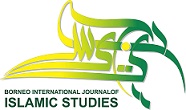Unification of Law in the Marriage and Divorce Processes of the Dayak Ngaju Muslim Communities in Central Kalimantan
Abstract
This research is a reflection of thoughts on the practice of marriage, and It examines the practices of marriage and divorce in the Dayak Ngaju tradition in Central Kalimantan. In practice, researchers found unification to be carried out autonomously in the legal system. This unification reflects a communal belief that integrates the customary law system, the positive law system, and Islamic law, particularly for Muslim communities. This study uses a non-doctrinal, empirical approach. The origin of the idea of unification of the legal system was motivated by a reflection of legal thought, which found the existence of a unification of three legal systems that work respectively and have a compatibility between the legal culture of living law, formal law, and maṣlahah. The essence of the thought of unification of the legal system is evidence of new insights or a new paradigm of factual elaboration and elaboration of norms in Dayak Ngaju customary marriage and divorce. However, the implementation of Dayak Ngaju’s traditional marriage and divorce, in practice, has become a living law in the society. It means that the modern legal-positivist paradigm is unable to replace the naturalist paradigm, but both are believed by the community to be able to bring the parties towards the philosophical goal of law, namely peace (maṣlahah).
References
Abby, Fathul Achmadi, Ifrani Ifrani, and Muhammad Topan. “Perkawinan Adat Suku Dayak Meratus Di Kalimantan Selatan.” Jurnal Penegakan Hukum Indonesia 2, no. 1 (2021): 21–39. https://doi.org/10.51749/jphi.v2i1.17.
Aditya, Zaka Firma, and Rizkisyabana Yulistyaputri. “Romantisme Sistem Hukum Di Indonesia : Kajian Atas Konstribusi Hukum Adat Dan Hukum Islam Terhadap Pembangunan Hukum Di Indonesia.” Jurnal Rechts Vinding: Media Pembinaan Hukum Nasional 8, no. 1 (2019): 37–54. https://doi.org/10.33331/rechtsvinding.v8i1.305.
Adiyanta, F C Susila. “Hukum Dan Proses Pengambilan Putusan Oleh Hakim : Menelusuri Khasanah Diskursus Tentang Teori-Teori Adjudikasi [ Theories of Adjudication ]” 4, no. 2 (2021): 252–64.
Ahmad Ulil Aedi, Sakti Lazuardi, Ditta Chandra Putri. “ARSITEKTUR PENERAPAN OMNIBUS LAW MELALUI TRANSPLANTASI HUKUM NASIONAL PEMBENTUKAN UNDANG-UNDANG (Architecture of the Application of Omnibus Law Through National Legal Transplantation Formation of Law).” Jurnal Ilmiah Kebijakan Hukum 14, no. 2 (2020): 1–18.
Ansori, Lutfil. “Reformasi Penegakan Hukum Perspektif Hukum Progresif.” Jurnal Yuridis 4, no. 2 (2018): 148. https://doi.org/10.35586/.v4i2.244.
Antoni, A. “Menuju Budaya Hukum (Legal Culture) Penegak Hukum Yang Progresif.” Nurani: Jurnal Kajian Syari’ah Dan Masyarakat, 2019, 237–50.
http://jurnal.radenfatah.ac.id/index.php/Nurani/article/view/4613.
Aristoni, and Junaidi Abdullah. “4 Dekade Hukum Perkawinan Di Indonesia : Menelisik Problematika Hukum Dalam Perkawinan Di Era Modernisasi.” Yudisia 7, no. 1 (2016).
Atmadja, I Dewa Gede, I Nyoman Putu Budiarta. Teori-Teori Hukum. Malang: Setara Press, 2018.
Benuf, Kornelius, and Muhamad Azhar. “Metodologi Penelitian Hukum Sebagai Instrumen Mengurai Permasalahan Hukum Kontemporer.” Jurnal Gema Keadilan 3, no. 2 (2019): 145–60.
Briando, Bobby. “Prophetical Law: Membangun Hukum Berkeadilan Dengan Kedamaian.” Jurnal Legislasi Indonesia 14, no. 3 (2017): 1–12. https://e-jurnal.peraturan.go.id/index.php/jli/article/download/123/pdf.
Cotterrell, Roger. The Politic of Jurisprudence. Philadelphia: University or Pennsylvania Press, 1989.
Endri. “Pluralisme Hukum Indonesia Bagi Hakim Tata Usaha Negara: Antara Tantangan Dan Peluang.” Jurnal Hukum Peratun 3, no. 1 (2020): 19–34.
Gordley, James. “The Functional Method of Comparative Law.” Methods of Comparative Law, 2012, 107–19. https://doi.org/10.4337/9781781005118.00012.
Hage, Jaap. “Comparative Law as Method and the Method of Comparative Law.” SSRN Electronic Journal, 2014. https://doi.org/10.2139/ssrn.2441090.
Lathif, Nazaruddin. “Teori Hukum Sebagai Sarana Alat Untuk Memperbaharui Atau Merekayasa Masyarakat.” Palar | Pakuan Law Review 3, no. 1 (2017): 73–94. https://doi.org/10.33751/palar.v3i1.402.
Lintang, Loresta Cahyaning, Adriano Martufi, and J W Ouwerker. “The Alternative Concepts of Blasphemy Law in Indonesia: Legal Comparison with Ireland and Canada.” Bestuur 9, no. 1 (2021): 13–25.
Maswandi. “Putusan Verstek Dalam Hukum Acara Perdata.” Jurnal Mercatoria 10, no. 2 (2017): 160. https://doi.org/10.31289/mercatoria.v10i2.1153.
Megawati, Rena. “Tinjauan Yuridis Mengenai Keabsahan Perkawinan Pariban Dalam Hukum Adat Batak Toba Dihubungkan Dengan Undang- Undang Nomor 1 Tahun 1974 Tentang Perkawinan.” Jurnal Wawasan Yuridika 28, no. 1 (2013): 65–74.
Najwan, Johni. “Implikasi Aliran Positivisme Terhadap Pemikiran Hukum.” Jurnal Law Positivism, Implication, Analytical Jurisprudence Vol. 2 No. (2010).
Nisa, Nurulia Shalehatun. “Tinjauan Fiqh ‘Urf Terhadap Praktik Perjanjian Perkawinan (Studi Empiris Adat Dayak Ngajudi Kota Palangka Raya).” Asasi : Journal of Islamic Family Law 2, no. 2 (2022). https://doi.org/10.36420/Asasi.
Noor, Muhammad. “Unifikasi Hukum Perdata Dalam Pluralitas Sistem Hukum Indonesia.” Mazahib 8, no. 2 (2014): 115–24.
Paputungan, Merdiansa. “Unifikasi Hukum Acara Pengujian Seluruh Peraturan Perundang-Undangan.” Al-Qisth 1, no. 2 (2017).
Rusma, N. Struktur Narasi Perkawinan Dayak Maanyan, 2020. http://eprints.ulm.ac.id/1492/1/1. Struktur Narasi Perkawinan Dayak Maanyan.pdf.
Sanjaya, Fransiskus O., and R. Kunjana Rahardi. “Kajian Ekolinguistik Metaforis Nilai-Nilai Kearifan Lokal Upacara Pernikahan.” Deiksis: Jurnal Pendidikan Bahasa Dan Sastra Indonesia 7, no. 2 (2020): 12–28. https://doi.org/10.33603/deiksis.v7i2.3283.
Sudjana. “Penerapan Sistem Hukum Menurut Lawrence W Friedman Terhadap Efektivitas Perlindungan Desain Tata Letak Sirkuit Terpadu Berdasarkan Undang-Undang Nomor 32 Tahun 2000.” Al Amwal (Hukum Ekonomi Syariah) 2, no. 1 (2019): 78–94.
http://literaturbook.blogspot.co.id/2014/12/pengertian-efektivitas-dan-landasan.
Sugiantari, Anak Agung Putu Wiwik. “Perkembangan Hukum Indonesia Dalam Menciptakan Unifikasi Dan Kodifikasi Hukum.” Paper Knowledge . Toward a Media History of Documents 5, no. 2 (2015): 109–22.
Sururie, Ramdani Wahyu, Mohammad Athoillah, and Muhammad Iqbal Zia Ulhaq. “Strategies to Prevent Increasing Divorce Rates for Muslim Families in Indonesia.” Samarah 7, no. 2 (2023): 734–59.
https://doi.org/10.22373/sjhk.v7i2.14819.
Sururie, Ramdani Wahyu, and Yoghi Arief Susanto. “Legal Aid Post Services at the Indonesian Religious Courts during the COVID-19 Pandemic.” Ahkam Jurnal Ilmu Syariah 20, no. 2 (2020): 207–32.
https://doi.org/10.15408/ajis.v20i2.17469.
Webley, Lisa. “Qualitative Approaches to Empirical Legal Research.” The Oxford Handbook of Empirical Legal Research, no. December (2012).
https://doi.org/10.1093/oxfordhb/9780199542475.013.0039.
Copyright (c) 2024 Jefry Tarantang, Ramdani Wahyu Sururie, Idzam Fautanu

This work is licensed under a Creative Commons Attribution 4.0 International License.


.png)






